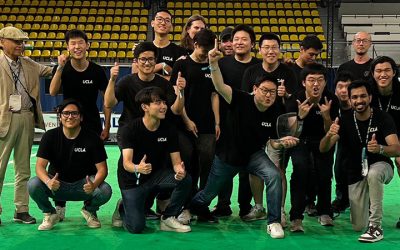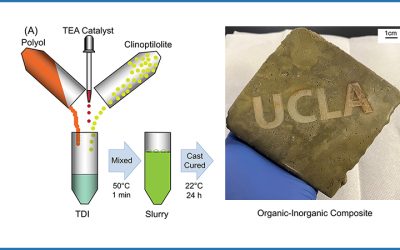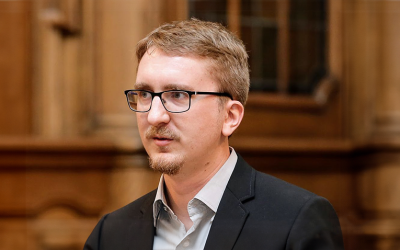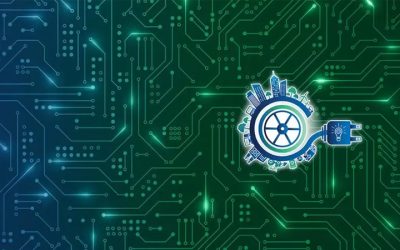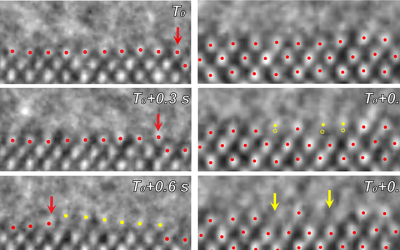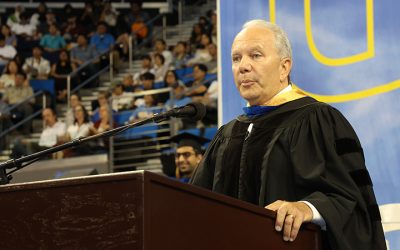
Engineers make the impossible possible.
For undergraduates, UCLA Samueli will prepare you for success in meeting the ever-changing demands of the engineering profession. The curriculum emphasizes breadth as well as depth. Classes are led by faculty members who are world leaders in their field. Numerous research opportunities are available for undergraduates. And the school has a thriving group of engineering student organizations, which offer undergraduates a chance to collaborate with their peers and make lifelong friends.
While a UCLA Samueli engineering degree often leads to an engineering career, it can also be a starting point for a wide range of career paths. UCLA Samueli alumni have successful careers in medicine, law, business, the arts, government, research, academics and other fields.
Plus, in addition to your engineering education, you can also enrich your experience in the intellectually vibrant and culturally energetic community of UCLA. The campus calendar is stacked with film festivals, lectures, art exhibitions, and more. Artists from around the world perform at Royce Hall, while UCLA Athletics offers a rich tradition with home venues that include the legendary Pauley Pavilion and the historic Rose Bowl in Pasadena, and more NCAA team championships than any other school in the country.
And finally, UCLA is located in one of the world’s great cities – Los Angeles.
For an excellent, well-rounded educational experience, UCLA Samueli has it all.

Bioengineers solve problems in biology and medicine by applying principles of physical sciences and engineering while applying biological principles to create new engineering paradigms, such as biomimetic materials, DNA computing, and neural networking.
Chemical engineers work in the biochemical and petroleum industries, and in areas such as energy, nanotechnology, systems engineering, biotechnology and biomedical engineering, and advanced materials processing, as well as overseeing the chemical process in many industries.
Civil engineers plan, design, construct, and manage a range of physical systems, such as buildings, bridges, dams and tunnels, transportation systems, water and wastewater treatment systems, coastal and ocean engineering facilities, and environmental engineering projects, related to public works and private enterprises.
Computer scientists are concerned with the design, modeling, analysis, and applications of computer-related systems. They work in areas such as computer system architecture, computer networks, distributed computer systems, programming languages and software systems, information and data management, artificial intelligence, computer science theory, computational systems biology and bioinformatics, and computer vision and graphics
Electrical engineers develop circuits, devices, algorithms, and theories that can be used to sense data, analyze data, extrapolate data, communicate data, and take action in response to the data collected.
Materials engineers are concerned with the structure and properties of materials used in modern technology. They build on the foundation of materials science and work to improve the design, fabrication, and optimal selection of engineering materials, and create new materials.
Mechanical engineers apply principles of mechanics, dynamics, and energy transfer to the design, analysis, testing, and manufacture of consumer and industrial products. They create machines used in manufacturing, mechanical components of electronics, engines and power-generating equipment, vehicles and their components, artificial components for the human body, and many other products.
UCLA Engineers Become 6-Time RoboCup Soccer World Champions
UCLA engineers dominated at RoboCup 2024 July 18–21 in Eindhoven, Netherlands, with a pair of humanoid ARTEMIS robots winning every game in the soccer tournament to snag the world championship.
UCLA Researchers Create High-Strength Composites by Upcycling Polymer Foams
A team of researchers led by UCLA chemical engineers has discovered a way to make tough and durable composite materials with strength comparable to that of cement, by recycling a common polymer foam found in sofas and mattresses.
UCLA Computer Scientist Receives $2.8M DARPA Grant to Demonstrate New AI Model
Guy Van den Broeck, a professor of computer science at the UCLA Samueli School of Engineering, has received a three-year, $2.8 million research grant from the Defense Advanced Research Projects Agency (DARPA) to lead
UCLA Researchers Part of National Science Foundation Project to Decarbonize Infrastructure
A pair of UCLA researchers are part of a five-year, $12 million research program funded by the National Science Foundation to decarbonize the full life cycles of infrastructure by optimizing and automating carbon efficiency across multiple sectors.
Atomic View of a Chemical Catalyst During Electrically Charged Reaction is a Scientific First
All around us are products that depend on chemical reactions aided by electricity. These electrochemical reactions are involved in manufacturing everything from aluminum and PVC pipe to soap and paper.
Walt Disney Imagineer and UCLA Alumnus Craig Russell Headlines Undergraduate Commencement
Former Disney Imagineer and UCLA Samueli School of Engineering alumnus Craig Russell ’80 delivered the keynote remarks at the UCLA Samueli undergraduate commencement ceremony Saturday, June 15.

